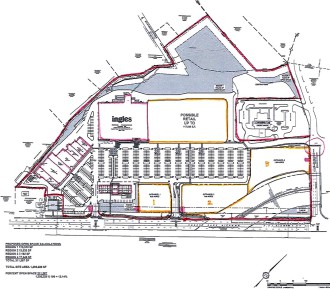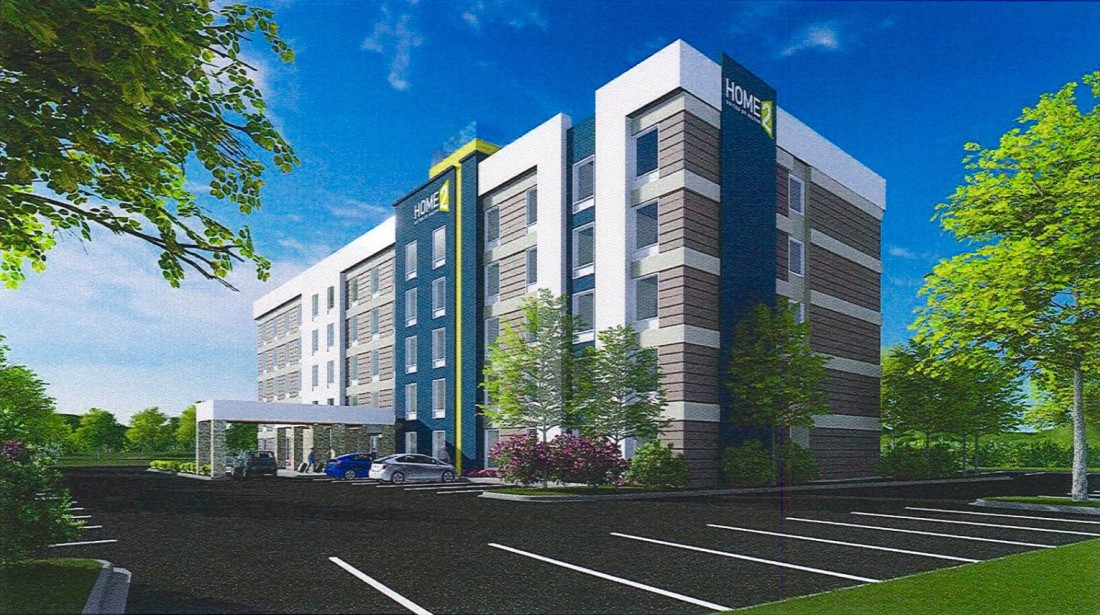As Asheville City Council tries to be sensitive to public backlash against Asheville’s downtown hotel boom, it put out the welcome mat for another hotel in South Asheville near the airport.
City Council approved a 112-room, five-story hotel project at 390 Airport Road at its Jan. 23 meeting, but not without some reluctance.
Greenville, S.C.-based Windsor Aughtry Commercial Group applied for conditional zoning from highway business to lodging expansion for a parcel near the Southridge Shopping Center, which includes such tenants as Target and OfficeMax.
Attorney Wyatt Stevens, representing the applicant, said his client ran a report that showed hotels of the same caliber in the area had occupancy rates of 80 percent, seven days a week, in 2016. “There is massive demand for hotels in that part of the county that is not being met by current hotels,” he said.
Stevens said the target market for the proposed extended-stay, Hilton-brand hotel would be not only tourists, but also corporate customers visiting the many manufacturing companies in the area.
Council member Vijay Kapoor, who lives in South Asheville, disagreed that another hotel is the best idea for that location. “I am actually quite strongly opposed to this,” he said. “What we’re doing here is we are going to be approving, if we approve it tonight, 11 hotels in a 1-mile radius, and I don’t think there’s any other part of the city where that’s occurring.”
Kapoor pointed out that this location was not part of Asheville when the city’s Comprehensive Plan was created, but nevertheless, development in that area would ideally be in line with it. “Every part of the city, as it stands right now, needs to fall under compliance with the Comprehensive Plan,” he said. “I have no doubt you all will be very successful if you build this, but the question is not whether or not you’re going to be successful, it’s whether or not this is good and rational and smart land-use planning.
Council member Keith Young acknowledged many Asheville residents’ distaste for more hotel development while suggesting that Airport Road, already being a busy business corridor, is a suitable spot for such a project. “Don’t act like you’re giving the city of Asheville something, because there’s lots of citizens who would gladly want me to say no to this tonight,” he told the development team. “But if you can’t put a hotel there, where can you actually put a hotel? It’s almost in Henderson County.”
Conditional zoning of the proposed hotel site passed 5-2, with Kapoor and Council member Brian Haynes voting no.
Ingles shopping center redux
Residents of West Asheville will be able to shop at a revamped Ingles grocery store in the future after City Council approved conditional zoning of 153 Smokey Park Highway for the renovation and expansion of the multi-tenant commercial development.

Stevens, representing the applicant, extolled the energy-efficiency of the planned new Ingles, which will replace the “vintage Ingles building” that dates to 1995. He also said the renovated store will employ 275-300 employees, as opposed to the current workforce of 55-60. Beyond Ingles, the center has space for yet-to-be-determined commercial tenants as well as a gas station and car wash.
Council member Julie Mayfield took issue with the plan’s elimination of pedestrian pathways and some landscaping, and she expressed a desire that the developer add back at least one pedestrian path, even if it meant reducing parking. “I will always vote in favor of trees and people over asphalt and parking spaces,” she said.
Stevens explained that the pathways would create traffic problems in the parking lot and he pointed to extensive landscaping planned for land behind the center.
The proposal passed 6-1, with Mayfield voting against it.
RADTIP projects back in play
Council unanimously voted to accept a contribution of $4.6 million from the Buncombe County Tourism Development Authority to help complete the southern section of the the River Arts District Transportation Improvement Project. The funding resurrects elements of the project that were cut after construction costs came in more 50 percent higher than initial cost estimates last summer, including pedestrian and bicycle improvements to Lyman Street.
Council also voted to amend the city’s contract with Beverly Grant/Barnhill, the project’s construction manager, to include the $4.6 million. Jade Dundas, interim assistant city manager, strongly recommended that the city use Beverly Grant/Barnhill for the previously postponed RADTIP work, rather than rebidding it as a separate project. “We have had experience over the last several years with increasing pricing,” he said, while Beverly Grant has agreed to do the work for $4.6 million, so that is a guaranteed price. “We don’t know what it would cost if we went out onto market.” He added that remaining with one contractor reduces scheduling conflicts and disruption to local businesses and residents.
In other business
City Council members expressed dismay about a draft plan by the N.C. Department of Transportation to widen a section of Merrimon Avenue (see “Residents to DOT: Let us participate in Merrimon planning,” Jan. 24, Xpress).
Council unanimously approved three requests for rezoning:
- A tract at 655 Brevard Road with a dental office will be rezoned from conditional use office to office zoning and an undeveloped wooded tract will be rezoned residential.
- An undeveloped parcel on an unnamed alley on Howard Street (technically with the address of 99999 Deaver St.) will be rezoned from residential to Haywood Road traditional. The applicant wants to include the parcel in an already-approved mixed-use project at Beacham’s Curve.
- The properties at 1093 Tunnel Place and 3 Oteen Park Place will be rezoned from highway business and residential to highway business conditional zone. The applicants are seeking more vehicle space for the auto service center they operate on the site.
The next City Council meeting is scheduled for Feb. 13 at 5 p.m. at City Hall. No public hearings are scheduled for that meeting.




Vijay Kapoor’s getting some early exposure to the problems of development where the city’s shape gets messy. Most of the hotels near the airport are in Fletcher. If there’s a place to put dull corporate hotels for business travelers, it’s near an airport next to a Chili’s and an Olive Garden. It’ll probably require some traffic adjustments for the left turn into Southridge, but that’s a terrible junction already.
I fully expect to the see the cafeteria, gas station, and excess airport parking lot across from the airport to be redeveloped into a hotel down the road.
Wouldn’t surprise me. That’s another bit of Fletcher.
And the bigger point about development around the airport is that when you have such a messy map — Asheville, unincorporated Buncombe, Fletcher, Mills River, unincorporated Henderson — all the relevant jurisdictions need to talk to each other, even if they don’t agree. It’d look dumb if a project gets turned down only for it to be built on the other side of the road or a few hundred yards away.
Sure, there’s no reason why all these political entities shouldn’t sit down & cooperate on important issues. They’re all adults, right?